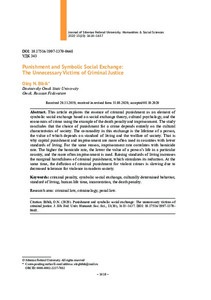Punishment and Symbolic Social Exchange: The Unnecessary Victims of Criminal Justice
Скачать файл:
URI (для ссылок/цитирований):
https://elib.sfu-kras.ru/handle/2311/137542Автор:
Bibik, Oleg N.
Бибик, О.Н.
Дата:
2020-10Журнал:
Журнал Сибирского федерального университета. Гуманитарные науки. Journal of Siberian Federal University. Humanities & Social Sciences;2020 13 (10)Аннотация:
This article explores the essence of criminal punishment as an element of symbolic social exchange based on social exchange theory, cultural psychology, and the economics of crime using the example of the death penalty and imprisonment. The study concludes that the choice of punishment for a crime depends entirely on the cultural characteristics of society. The commodity in this exchange is the lifetime of a person, the value of which depends on standard of living and the welfare of society. That is why capital punishment and imprisonment are more often used in countries with lower standards of living. For the same reason, imprisonment rate correlates with homicide rate. The higher the homicide rate, the lower the value of a person’s life in a particular country, and the more often imprisonment is used. Raising standards of living increases the marginal harmfulness of criminal punishment, which stimulates its reduction. At the same time, the deflation of criminal punishment for violent crimes is slowing due to decreased tolerance for violence in modern society В данной статье исследуется сущность уголовного наказания
в качестве элемента символического социального обмена на основе теории
социального обмена и культурно-исторической
психологии на примере смертной
казни и лишения свободы. Сделан вывод, что эквивалентом при таком обмене
выступает время жизни человека. В связи с этим смертная казнь и лишение
свободы применяются чаще в странах с более низким уровнем жизни. По этой же
причине динамика использования лишения свободы коррелирует с динамикой
убийств. Чем больше убийств, тем меньше стоимость жизни человека
в конкретной стране, тем чаще в ней применяется лишение свободы. Повышение
уровня жизни увеличивает предельную вредность уголовного наказания, что
стимулирует его смягчение. Вместе с тем процесс дефляции уголовного наказания
за насильственные преступления замедляется ввиду уменьшения в современном
обществе толерантности к насилию

